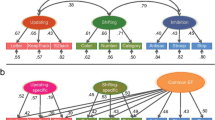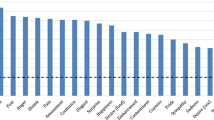Abstract
Spanish-English coordinate bilinguals were subjects in a GSR linguistic conditioning experiment using strong and mild buzzer conditions and spoken stimuli. Each subject was randomly assigned to one of two lists of words and one of two levels of buzzer sounds. A Spanish word from the Spanish list and an English word from the English list functioned as a conditioned word (CS). The lists were Spanish and English words related semantically and phonemically and unrelated to the CS. Generalization was studied under conscious and unconscious conditions. We found that both buzzer conditions resulted in significantly greater GSR responses to semantic and phonemic words than to words unrelated to the CS. Generalization to semantic words was not significantly greater than to phonemic words. There was a tendency toward greater phonemic than semantic generalization in the strong buzzer condition. The opposite was observed regarding the mild buzzer. The results were the same in both lists and languages. Under a conscious and unstressful condition, generalization to semantic words was found to be more prominent than to phonemic words. This suggests that under normal condition semantic generalization is mediated by conscious cognition. We concluded that strong emotion produces an increase in phonemic, as compared to semantic, generalization in both languages. Hence, primitivization of the subjects' cognitive and linguistic functioning is assumed to have occurred. These results are important in understanding the deleterious effect that stressful situations may have on linguistic functioning and cognition in bilinguals.
Similar content being viewed by others
References
Albert, M., & Obler, L. (1978).The bilingual brain: Neuropsychological and neurolinguistic aspects of bilingualism. New York: Academic Press.
Appley, M.H., & Trumbull, R. (1965).Psychological stress: Issues in research. New York: Appleton-Century-Crofts.
Bridger, W.H. (1970). The role of cognitive set and stress in generalization of conditional responses to verbal stimulus.International Journal of Psychobiology, 1, 39–42.
Bridger, W.H., & Mandel, I. (1965). Abolition of PRE by instructions in GSR conditioning.Journal of Experimental Psychology, 69, 476–482.
Ellis, H.C., Thomas, R.L., McFarland, A.D., & Lane, J.W. (1985). Emotional mood states and retrieval in episodic memory.Journal of Experimental Psychology: Learning, Memory, and Cognition, 11, 363–373.
Ellis, H.C., Thomas, R.L., & Rodriguez, E. (1984). Emotional mood states and memory: Elaborative encoding, semantic processing, and cognitive effort.Journal of Experimental Psychology: Learning, Memory, and Cognition, 10, 470–482.
Ervin, S. (1964). Language and TAT content in bilinguals.Journal of Abnormal and Social Psychology, 68, 500–507.
Ervin, S., & Osgood, C.F. (1954). Second language learning and bilingualism.Journal of Abnormal and Social Psychology, 49, 139–146.
Feather, B. W. (1965). Semantic generalization of classically conditioned responses: A review.Psychological Bulletin, 63, 425.
Fishman, J.A., Cooper, R.J., & Ma, R. (1975). Alternative measures of bilingualism. In J.A. Fishman, R.J. Cooper, & R. Ma (Eds.),Bilingualism in the Barrio. Bloomington: Indiana University.
Hines, T. (1978).Bilingual memory: Independent, interdependent, or both? Paper presented at the Annual meeting of the Americal Psychological Association. Toronto.
Javier, J. (1982).The effect of stress on the language independence phenomenon in coordinate bilinguals. Unpublished doctoral dissertation, New York University.
Lambert, W. (1972).Language, psychology, and culture, Stanford: Stamford University Press.
Lambert, W., Havelka, J., & Crosby, C. (1958). The influence of language-acquisition contexts on bilingualism.Journal of Abnormal and Social Psychology, 56, 239–244.
Luria, A. (1981).Language and cognition. Washington, D.C.: V.H. Winston.
Luria, A., & Vinogradova, U. (1959). Objective investigation of the dynamic of semantic systems.British Journal of Psychology, 50, 84.
Luria, A., & Yudovich, F. (1968).Ia. Speech and the development of mental processes in the child. London: Staples Press.
Macnamara, J. (1967). How can one measure the extent of a person's bilingual proficiency? In L. Kelly (Ed.),Description and measurement of bilingualism: An international seminar, University of Moncton, June 6–14, Toronto (pp. 80–90), Toronto: University of Toronto Press.
Mahl, G.F. (1959). Measuring the patient's anxiety during interviews from “expressive” aspects of his speech.Annals of the New York Academy of Sciences, 21, 249–257.
Marcos, L.R., & Alpert, M. (1976). Strategies and risks in psychotherapy with bilingual patients: The phenomenon of language independence.American Journal of Psychiatry, 133, 1275–1278.
Pope, B., Blass, T., Siegman, A.W., & Raher, J. (1970). Anxiety and depression in speech.Journal of Consulting and Clinical Psychology, 35, 128–133.
Razran, G.H.S. (1939). A quantitative study of meaning by a conditioned salivary technique (semantic conditioning).Science, 90, 89–90.
Reiss, B. (1940). Semantic conditioning involving the galvanic skin reflex.Journal of Experimental Psychology, 26, 238–240.
Reiss, B. (1946). Genetic changes in semantic conditioning.Journal of Experimental Psychology, 36 143–152.
Schwartz, L. (1960). Conditioned reflexes to verbal stimuli.Problems of Psychology, 1, 36.
Shapiro, D., & Schwartz, G.E. (1972). Biofeedback and visceral learning: Clinical applications.Seminars in Psychiatry, 4, 171–184.
Teasdale, J.D., & Fogarty, S.J. (1979). Differential effects of induced mood on retrieval of pleasant and unpleasant events from episodic memory.Journal of Abnormal Psychology, 88, 248–257.
Toomin, M.K., & Toomin, H. (1975, February).Psychodynamic correlates of the paradoxically invariant GSR. Paper presented at the Biofeedback Research Society Convention, Monterey.
Vygotsky, L.S. (1962).Thought and language. New York and London: M.I.T. Press, Wiley.
Author information
Authors and Affiliations
Rights and permissions
About this article
Cite this article
Javier, R.A., Alpert, M. The effect of stress on the linguistic generalization of bilingual individuals. J Psycholinguist Res 15, 419–435 (1986). https://doi.org/10.1007/BF01067723
Accepted:
Issue Date:
DOI: https://doi.org/10.1007/BF01067723




